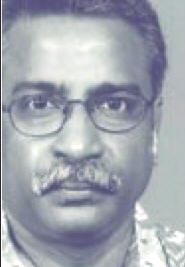|
International Relations
in THE AGE OF EMPIRE Change Course in Sri Lanka
or Face Misfortune
M.S.S.Pandian
Times of India, 23 October 2008
Dr. M. S. S. Pandian sits on the New
York-based Social Science Reseach Council's South Asia Advisory Panel,
and is Visiting Fellow of the Sarai Programme, Centre for the Study of
Developing Societies, Delhi. His publications include "Brahmin &
Non-Brahmin: Genealogies of the Tamil Political Present", "Muslims,
Dalits, and the Fabrications of History" and "The Image Trap: M G
Ramachandran in Film and Politics"
"Tamil Nadu had a history of demanding
secession from the Indian Union. Yet, over time, it has chosen to integrate
itself fully with the national mainstream. If New Delhi does not change
course in its Sri Lankan policy, it may plant the seeds towards a reversal
of such history. That will be India's misfortune".
[see also We won’t stop military cooperation with Lanka says Indian
External Affairs Minister Pranab Mukherjee, 23 October 2008 together with Comment by
tamilnation.org
]
|
|
 A recent issue of a Sri Lankan newspaper has published excerpts
from the memoirs of Neville Jayaweera, a distinguished civil servant who once
headed the Ceylon Broadcasting Corporation. The excerpts deal with his
appointment as the government agent in Jaffna in the Tamil-majority Northern
Province in Sri Lanka in 1963 and his encounter with N Q Dias, permanent
secretary of defence and external affairs, whom Jayaweera describes as "the most
powerful public servant around". A recent issue of a Sri Lankan newspaper has published excerpts
from the memoirs of Neville Jayaweera, a distinguished civil servant who once
headed the Ceylon Broadcasting Corporation. The excerpts deal with his
appointment as the government agent in Jaffna in the Tamil-majority Northern
Province in Sri Lanka in 1963 and his encounter with N Q Dias, permanent
secretary of defence and external affairs, whom Jayaweera describes as "the most
powerful public servant around".
As Jayaweera recounts, Dias instructed him that his brief in Jaffna was to
enforce at any cost the Sinhala Only Act which disenfranchised the minority
Tamils of their linguistic rights and handicapped them educationally. Dias knew
the consequences of such acts of discrimination against the Tamils. He predicted
to Jayaweera in 1963 that within 25 years, there would be armed rebellions by
the Tamils against the Sri Lankan state, a prediction which no doubt proved
right. Yet he did not want to address the rightful concerns of the Tamil
minorities but sought a military solution to the possibility of a future armed
rebellion by the Tamils. Jayaweera notes, "The centrepiece of Dias's strategy to
contain a future Tamil revolt was to be the establishment of a chain of military
camps to encircle the Northern Province..."
Dias also laid out a strategy to legitimise his plan for military camps around
the Northern Province. That is, to present the military camps as a means to
prevent illegal immigrants from India and to contain smuggling from Sri Lanka to
India. Remarkably, smuggling and illegal immigration continues to be themes
employed both by India and Sri Lanka to legitimise their actions even today. In
the 1980s, "it was this iron pincer around Jaffna's neck that served as the Sri
Lankan army's bulwark against the Tamil militant groups".
The 'Dias paradigm', which is to deny the minorities their rights and suppress
their protests militarily, is sure to warm the hearts of xenophobic militarists
everywhere. But it ultimately did not work. The Sri Lankan state's militaristic
approach has failed both in finding a solution to the Tamil question and in
containing the armed rebellion of the Tamils. Instead, it has only increased the
misery of all in the island nation, in particular the Tamils.
The Sri Lankan state believes that it can vanquish the LTTE in the current war.
What will be the meaning of such a victory even if that happens? It can only be
a victory bringing extra cheer to the Sinhala hardliners. The Sri Lankan state
has already achieved most of what it wants to. Tamils in Sri Lanka have been
reduced to refugees in their own country. A substantial number of them have
migrated to far-flung places as refugees.
The demographic balance of the once Tamil-majority Eastern province has already
been altered by state-sponsored colonisation of land by the Sinhala peasants.
Going by past record, the Sri Lankan state will pursue its majoritarian goals
with new vigour if the LTTE gets defeated.
After all, it took away the rights of the Tamils even when they followed
peaceful Gandhian forms of protests under the leadership of S V J Chelvanayakam.
India's role in all this is dubious. It has been training Sri Lankan military
officials. It has also been supplying radars in the name of defensive military
hardware. And, now it is clear that Indian technicians are aiding the Sri Lankan
army in the very theatre of war. The miserable plight of civilian Tamils in Sri
Lanka has already caught the attention of Tamil Nadu.
Significantly, the broad sentiment in Tamil Nadu this time is not merely against
Colombo but against New Delhi as well. It is widely perceived in Tamil Nadu that
New Delhi is collaborating with Colombo in authoring the misery of the Tamils in
Sri Lanka.
Tamil Nadu had a history of demanding secession from the Indian Union. Yet, over
time, it has chosen to integrate itself fully with the national mainstream. If
New Delhi does not change course in its Sri Lankan policy, it may plant the
seeds towards a reversal of such history. That will be India's misfortune.
|